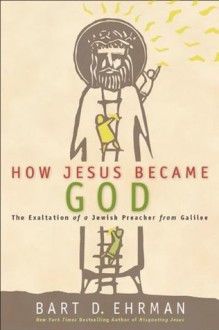
I'm not completely sure why I decided to read this one. It's a different from the religion books I tend to read (I've also read God is Not Great: How Religion Poisons Everything this month and that is an odd combination!)
This book is very focused on the early history of Christianity which is something I know very little about (this book and Karen Armstrong's The Case For God are really the only one's I've read that have anything to do with the early church).
There are several things that stuck out in this book. One is that the word betrayal itself might be a mis-translation becasue the word used really means "to give over to someone else" (likely not the complete/perfect translation, since that's from my memory). Another is that stories were at the time often changed to suit the needs of the person telling them, historical accuracy didn't figure in at all. Historical accuracy is mentioned at the end of the book (and; therefore, this review).
The Gospel itself is interesting, although the codex has had a difficult journey from the desert to the point of this author having a chance to translate and read it. It might have been complete (or very close to it) when it was discovered but the years (and humidity and freezing - really who thought that was a good idea?) have made parts of it hard or even impossible to read. It was painstakingly pieced back together and some parts of it are completely unreadable.
It presents a very different view of Judas and his 'betrayal' of Jesus. Judas is the only one that really knows who Jesus is and understands what must happen - the death of Jesus' human body so he can return home. This view suggests that Jesus knew and even wanted Judas to "betray" (can it be a betrayal if the other wants it to happen?) him.
The last chapter (? best guess, this is an audiobook and I didn't pay that much attention to chapters) is focused on Judas and Jesus as historical figures - who were they really and what did they do? Really knowing the answers to these questions requires having several contemporary sources that do not get their information from each other but have similar stories to tell. We don't have that for either man's life, so it's hard to piece what might have really happened. There are some clues that suggest that Jesus and his followers were apocalyptic - they believed that the apocalypse was going to happen soon (within their lifetimes). When it didn't happen the views had to change - they'd been wrong, clearly so the focus couldn't be on their apocalyptic views any longer.
I really need to remember to take notes. I did okay for the first half or so but completely stopped before part 4 (of 7 total) started. Sorry if this review is confusing!
I really hated the music at the start and end of each part/chapter. It wasn't so bad when the chapter was over and the narrator hadn't started talking again but it was hard to hear him over the music sometimes, since there was some overlap.


 Log in with Facebook
Log in with Facebook 







